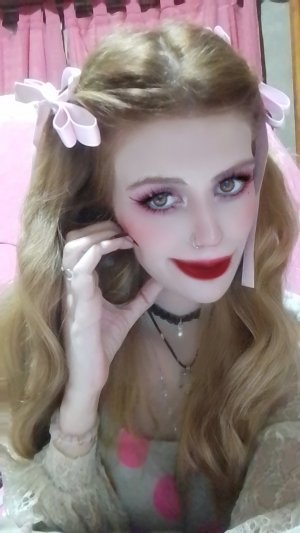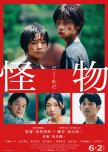This review may contain spoilers
Really, who is he monster? Society or us?
When I started watching the movie I didn't know what I was going to find. In fact, I didn't understand anything, why Minato started behaving strangely? Why did he tell his mother that he had the head of a pig? Whether his teacher was good or not? I didn't know what was happening in front of me but then I realized where the movie was going.
Let's say that the movie is divided into 3 visions, that of Minato and Yori, that of the teacher and the present. With the teacher's vision, it was there that I understood what a pig's head means, since the teacher, when he goes to Yori's house to find out what was happening, His father tells him "that he has a pig's head, that he is a monster and not a human and that he is trying to make his son "normal".
At first you are left as the teacher "What the hell is this man saying?", the pieces begin to fit when Minato's mother tells him that his father only wanted him to have one. "normal family" and an enlightening talk with the school principal makes you put together all the pieces of the puzzle, since he confesses to her that he likes someone but he can't be with that person he loves and also fulfill his mother's wish. In these three visions, you realize why Minato acted the way he acted and it wasn't that he was crazy or something, it was just that he, mainly, was at first denied his sexuality and this is seen when Yori wants to hug him and he pushes him away very hard. and Yori tells him that he understands.
At first everything seems very normal, two children playing, nothing more, but the further you go you see how dark the matter is. And I say this because when Minato goes to visit Yori he tells him that "he is cured" but moments later, before Minato leaves, half saddened, Yori tells him that he lied to him and he still has a pig brain and that's when his father takes him inside and begins to beat him, a beating that Minato hears but cannot do anything about.
Minato hasn't seen Yori for days and despite the typhoon, he goes in search of Yori and there he finds him in a bathtub, where clearly Yori's father wanted to kill him. As best he can, Minato goes to the shelter, the shelter that they had built (where they could be happy without the prejudices of others and be together). Meanwhile, the teacher, upon reviewing his students' work, realized that Minato had written his name along with Yori's, where he realized everything, he was going to apologize to Minato for having misunderstood him with Typhon, Yori's mother. Minato is angry with him but the teacher asks her to listen to him, as he has something to show him. From there, regardless of the typhoon, they go to look for Minato.
At first you think "they have been saved from the typhoon" but that is not the case. There is a celestial gate that could not be opened at one moment, but in their astral field that celestial gate no longer exists and they are seen running, happy. But they are clearly dead.
What Koreeda presents to us is a harsh and sad reality, if you go outside of the normal or "common" you are seen in society as a sick person (there is the metaphorical "pig's head"), an abnormal or even a monster. People who like people of the same sex can tell you clearly that the supposed "diversity" is a lie. Even I who have "normal tastes" (and I put it in quotes ironically) can tell you that I have seen how they are constantly discriminated against, their relatives do not accept them because they believe that they are sick, beaten, or even driven to the extreme of suicide.
Minato was clearly raised in a macho environment, where there are things or greetings that only "real men" do, while Yori likes "girly things" and is severely beaten by his father to "make him normal", when clearly you see that he is abnormal and has a big mental problem.
Here Koreeda does not call us "monster" because he considers children to be one. He does it on purpose, so that the viewer asks questions about who the real monsters are. Putting us at a crossroads and breaking all our beliefs. Clearly I know that children are completely normal and the abnormal ones were the adults. Not them.
I don't have that many beliefs about myself, so I totally believe in the book alberdrio. Everyone likes what they like, period. But there are a lot of people out there who don't think the way I am and I'm aware of that. In fact, when the other day I was choosing a bracelet for my father, my boyfriend told me "this is for women" and I told him "maybe there are things for men or women?"
Perhaps it may seem painful to many that they have died, but seeing their Panorama I think the only thing that would free them would be death. Since they could be free without ties from society or prejudices. The children acted very well for being children. Everyone acted very well and the cinematography is beautiful and clearly showed the children's dark moments as well as when they were happy.
And the message and the metaphors are beautiful. Although it is very sad, it is a reality.
Koreeda gives an invitation to reflect on the world we live in, our beliefs or values, even the values of our parents.
Let's say that the movie is divided into 3 visions, that of Minato and Yori, that of the teacher and the present. With the teacher's vision, it was there that I understood what a pig's head means, since the teacher, when he goes to Yori's house to find out what was happening, His father tells him "that he has a pig's head, that he is a monster and not a human and that he is trying to make his son "normal".
At first you are left as the teacher "What the hell is this man saying?", the pieces begin to fit when Minato's mother tells him that his father only wanted him to have one. "normal family" and an enlightening talk with the school principal makes you put together all the pieces of the puzzle, since he confesses to her that he likes someone but he can't be with that person he loves and also fulfill his mother's wish. In these three visions, you realize why Minato acted the way he acted and it wasn't that he was crazy or something, it was just that he, mainly, was at first denied his sexuality and this is seen when Yori wants to hug him and he pushes him away very hard. and Yori tells him that he understands.
At first everything seems very normal, two children playing, nothing more, but the further you go you see how dark the matter is. And I say this because when Minato goes to visit Yori he tells him that "he is cured" but moments later, before Minato leaves, half saddened, Yori tells him that he lied to him and he still has a pig brain and that's when his father takes him inside and begins to beat him, a beating that Minato hears but cannot do anything about.
Minato hasn't seen Yori for days and despite the typhoon, he goes in search of Yori and there he finds him in a bathtub, where clearly Yori's father wanted to kill him. As best he can, Minato goes to the shelter, the shelter that they had built (where they could be happy without the prejudices of others and be together). Meanwhile, the teacher, upon reviewing his students' work, realized that Minato had written his name along with Yori's, where he realized everything, he was going to apologize to Minato for having misunderstood him with Typhon, Yori's mother. Minato is angry with him but the teacher asks her to listen to him, as he has something to show him. From there, regardless of the typhoon, they go to look for Minato.
At first you think "they have been saved from the typhoon" but that is not the case. There is a celestial gate that could not be opened at one moment, but in their astral field that celestial gate no longer exists and they are seen running, happy. But they are clearly dead.
What Koreeda presents to us is a harsh and sad reality, if you go outside of the normal or "common" you are seen in society as a sick person (there is the metaphorical "pig's head"), an abnormal or even a monster. People who like people of the same sex can tell you clearly that the supposed "diversity" is a lie. Even I who have "normal tastes" (and I put it in quotes ironically) can tell you that I have seen how they are constantly discriminated against, their relatives do not accept them because they believe that they are sick, beaten, or even driven to the extreme of suicide.
Minato was clearly raised in a macho environment, where there are things or greetings that only "real men" do, while Yori likes "girly things" and is severely beaten by his father to "make him normal", when clearly you see that he is abnormal and has a big mental problem.
Here Koreeda does not call us "monster" because he considers children to be one. He does it on purpose, so that the viewer asks questions about who the real monsters are. Putting us at a crossroads and breaking all our beliefs. Clearly I know that children are completely normal and the abnormal ones were the adults. Not them.
I don't have that many beliefs about myself, so I totally believe in the book alberdrio. Everyone likes what they like, period. But there are a lot of people out there who don't think the way I am and I'm aware of that. In fact, when the other day I was choosing a bracelet for my father, my boyfriend told me "this is for women" and I told him "maybe there are things for men or women?"
Perhaps it may seem painful to many that they have died, but seeing their Panorama I think the only thing that would free them would be death. Since they could be free without ties from society or prejudices. The children acted very well for being children. Everyone acted very well and the cinematography is beautiful and clearly showed the children's dark moments as well as when they were happy.
And the message and the metaphors are beautiful. Although it is very sad, it is a reality.
Koreeda gives an invitation to reflect on the world we live in, our beliefs or values, even the values of our parents.
Was this review helpful to you?

















